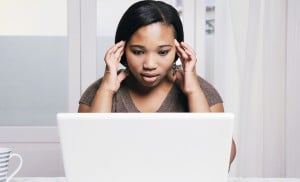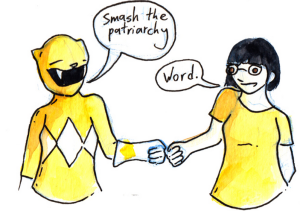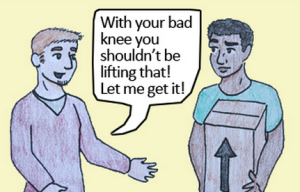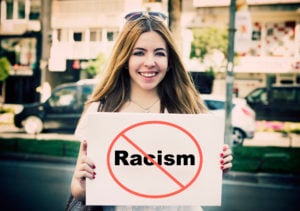Announcer: Degrassi Group Chat – Mental Health: Part 1
Adamo: Awesome, so, we just wanted to kind of chat about your guys’ experience. I don’t know, we’ve never really spoke about mental health very much and just maintaining good mental health.
Person 1: And you guys came here…
Adamo: There you go.
I know I had a pretty rough time in high school, for me. I was gay and I was closeted, then I was on a show called Degrassi for so many years and I was playing a gay character. And it was just all very confusing. [laughter]
Person 1: Where is my life going?
Adamo: I was like, “Who am I? What’s happening?”
And there were, like, terrible moments where I was really confused, really stressed, really depressed, and I didn’t seek proper help. I think partially ‘cause no one spoke about it.
I didn’t really know personally that I was dealing with anything different. I thought, Teenage life is hard, but I didn’t even get why my peers found it so much easier.
So I guess my question is, like: What is the difference between those normal teenage pressures and the pressures that do need some extra attention?
Person 2: Me, personally, although I had heavier struggles with the social anxiety. I think even just from the stuff that I learned in certain programs, everyone could use having knowledge about your mental health and on – daily taking care of yourself and analyzing thoughts and all of that. I think it’s important for basically anybody to understand how your mind works and why it’s working.
Teenagers are going through all these changes. It’s crucial I think for anybody, not even just people who are struggling right now.
Person 3: I found that when I can’t approach my teachers, really, when I can’t really trust people who are in my own friend group, or anyone there, it makes it harder for me to actually wanna go to school. And then I get behind on school, and then my grades drop, and that’s how everything starts up again.
So, usually I find that school is just, like, a burden.
Adamo: Did you have positive experiences maybe with the counselor or a teacher that did reach out to you? Or has it been few and far in between in the school setting?
Person 4: Basically, the counselor did not reach me out. I was the one who reached out from them. If I felt like there’s… triggering inside my head that I can not explain, something that talks on my brain saying, Everybody hates in this class because you’re the only gay person.
So I was like, I don’t want to go back to this class anymore because they’ll just make fun of me.
I’m also struggling to come out to my friends. The way I walk, the way I talk to people, they’ll always make fun of me because I’m a different person.
One of my friends said, “Hey, why are you dressing up like a guy?”
And I was like, “Because I am comfortable.”
So what she did was she bought me girly clothes from the Bay and she said, “You have to wear these ‘cause it looks good to you.”
But deep inside, I was crying. I said, “Why am I supposed to change for who I am?”
And I was like, I don’t know where to reach out, ’cause I don’t feel really powerful, ’cause I’m just a student and nobody listens.
There are things that stuck in my head and I can’t even say what I want to that person just to accept me for who I am. That’s my struggle in school.
Adamo: Well, you know, you have done such a fantastic first step, because you knew that you could reach out to resources and said, “I need more, I can’t just sit here. Otherwise I’m not gonna go to school and I’m gonna feel underrepresented in my school and in my community,” and that is such an incredible act of bravery. It really is, man.
‘Cause I didn’t have that bravery, and I truly believe that if I didn’t have Degrassi – which was this world that pulled me in and taught me about myself – I don’t know what would have happened to me. I genuinely have no idea.
So I understand your struggle and I sympathize very much. And I think the first thing we can do is talk about it. We all have these challenging moments in our life.
Is there a difference between maintenance of mental health and then mental illness?
Person 2: Well, me, with a social anxiety, I know that anxiety is kind of universal. Everyone feels anxiety and the fight-or-flight at some point. You don’t need to be on the heavier side of the spectrum of mental health to feel it.
But when it becomes overwhelming, when you can’t get out of your house, when you can’t get into class because you just feel too anxious to do things, that’s when it starts to become more of a problem.
We’re kind of in this revolution of mental health, because the conversation needs to start so that when you do talk to your teacher and say you can’t do this class presentation, they don’t just kinda say, “Oh, you’re just feeling anxious, get over it.” They have to get that the mentality that a lot of people have is so wrong.
If somebody said that they couldn’t do gym ‘cause they had a broken leg, they would be excused from it. Just because it’s not a physical disability it doesn’t mean it’s not just as disabling, you know?
Person 1: A lot of people has been troubled with anxiety, all the way back from the Great Depression, way back to the Holocaust, way back, when all of that happened.
It’s like no one really understood how to deal with themselves right, so their kinda thing was spirituality.
Adamo: I know what you’re saying – it’s like having the ability to have some peace of mind and to create that peace for yourself. I think it’s something that would maintain all of our mental health, and especially if you can learn that skill young, you can kind of hone in on it and perfect it.
How do you feel with the label of – like you were saying – of “mental illness” or “crazy”? How does that make you feel?
Person 4: I feel really isolated. You’re always alone because you’re the only person struggling that mental health issue.
‘Cause mental health is really invisible, and not all people can notice that to you.
Person 3: I remember when I first started realizing that I had some anxiety problems, I would talk to my close friends and family about it.
At the beginning, lots of them said, like, “Oh, you’re in high school. Life isn’t hard. I don’t want you to complain about this. There’s bigger problems; there’s children dying in Africa.”
And I said, “Yes, I know this, of course, but that doesn’t mean that I don’t have problems.”
I would always convince myself, Hey, maybe they’re right, maybe I’m just being crazy or I’m being too much, or too extra for people to handle.
I found it – yeah, it was very isolating for me too. Not only did it made me feel… very lost, I would have so many people be like, “Oh yeah, you have anxiety, sure. You all have anxiety. All you teenage girls have anxiety.”
Person 1: [crosstalk] “Are you sure you have anxiety?” Like, yes. Like, yes…
Person 2: When Avi first came to me with this offer to come and talk about it, the first thing I told her is, “I don’t think my problems are as big as other people’s.”
I struggled with that. I felt like… I don’t know, it wasn’t worth anyone’s time or anyone would necessarily care about it.
Person 2: Like you said, it’s invisible. So I’d look at the people around me in high school and stuff like that, and be like, “You guys seem like you have it all together. You all know what you’re doing and I’m just completely lost, just walking through completely blinded. It’s terrifying.”
Person 3: You really have to put yourself in someone else’s shoes to try to understand mental health.
Adamo: Maybe it’s a large part of the reason why I never spoke up, ’cause I felt like, “I’m not good enough, I can’t keep it together.”
Person 1: I kinda feel like I can relate to that. There were times when I was growing up with my parents – ’cause my parents like, my stepmom is from East Africa, but my dad is from Pakistan – so, like, I grew up in a very traditional, conservative Pakistani family.
They caught me calling Kids Help Phone and they found out, they were like, “Why are you telling people you have problems?” I always had to be closeted and hide them, and so they kinda thought me to deal with everything that comes my way by myself.
Person 4: As a Filipino, too, background, my parents really don’t care about mental health. They said, like, “No, it’s only, like, a phase. That’s not real. It’s only in your mind.”
Adamo: The thing with immigrant parents, too – I have them – they’re hard.
Person 4: Yeah, they are.
Adamo: They really hard, because it’s not only their generation that’s different, their culture is different. And suddenly we’re born here, now [laughter] and expected to kind of do very well here, now but still get there, then – and somehow make both of these work.
Person 2: When I first started to get involved with the programs, my mom – I’m sorry, Mom – but she said that they called me a lot, these programs, that they were letting me succumb to a lot of the things, but that was half the battle – is understanding why these things happen, why you feel that way.
Like, I went from being locked in my house and not being able to look out a window to now being able to take the bus, sit here in front of the cameras, and talk about my struggle.
And now she sees – just like you said – you can prove to them what – in the process that you were taking, they might not understand why you did it the way you did, it was important, it was crucial to get to the point that we’re all at now.
Person 4: These people that involved in my life, they became really part of my family, because they push me to do something that I wanted to do.
Something that I can achieve, and prove my family, friends, or enemies that what they were thinking about mental health is wrong. I can still achieve my goals. I can still learn.
I’m learning – I still do mistakes, obviously – but then I’m learning my lessons from them. Without those people, I cannot just go in front right now and just say, “These are my struggles and those are my achievements.”
It’s just like wonderful sometimes to have mental health, because it can turn into positive. It can turn into creativity, too.
Adamo: But, like, finding – it’s so funny, like, if you’re interested in the arts or –
Person 4: Oh! Arts!
Adamo: If you’re interested in the arts or you’re interested in sports or you’re gay or having mental health challenges or whatever it might be, it’s finding a community of people that are like yourself I think is, for me, for has been the greatest healing and has helped me to feel less alone.
Being open and compassionate with each other always wins. It always wins.
I am really curious, like, how it’s all presented, how you guys think mental health is presented in the media. Things like Mental Health Week or characters you see on TV, just things like that. Are these – do you feel they’re accurate representations?
Person 3: There was a lot of media who came to my school talking about mental health and it seems that they’re on the right track. They’re really getting the major points that were really missing for a really long time. And that really negative cloud that was kind of put upon it is, like, slowly being moved away. I don’t know if anyone else sees that – I see it.
Person 1: There are a lot of opportunities to kind of teach us about mental health, but I don’t think it’s even mentioned in the media, to be honest.
Person 2: I find that there are a lot of people who come out of the woodworks for mental health and can do all the Facebook posts and make sure that everyone sees that; but I know from experience, even exes and stuff like that, I’ll see them post things for Mental Health Week and I go, like, “You know, I tried to teach you about my struggles with mental illness and you never really had an interest, you said the get-over-it thing.”
Adamo : Overall, these mental health weeks, I feel the same. Everyone’s coming out of the woodworks. They see a couple of celebrities tweet something. It becomes this big, glamorized issue.
Person 2: And after a week it’s all gone. It’s not a conversation again.
Adamo: And then it’s done. Am I being cynical?
Person 2: Go back and hide, mental health patients.
Adamo: You guys are such leaders, because you’ve spoken so openly about your experiences and you looked for help, and you’ve educated yourselves and now you can share your knowledge with others.
So you know, in the same vein, there’s a young person who’s having a really tough time at home and at school: What advice do you give them?
Person 2: Rihanna. I say Rihanna and Beyonce. [laughs] I love her, she is my babe and a half, I love Rihanna. Okay, sorry, continue.
Person 3: Definitely stay outside of your house. Don’t stay inside your house. Don’t focus on everything bad – like, I would be sitting in my room and think of 12 bad things that happened to me in the past two hours and then be like, Should I really go outside? Is it really worth it to go?
But I’ll go anyway. Find things that keep you happy and smiling.
Person 2: Don’t be scared to ask for help. Like today, I was super nervous to come down and do this. And I come down to this building once a week and I do it fine by myself.
But today, because of all of this going on, I was feeling very anxious, so I asked a friend to come down with me, and we went to see a movie while we’ve been sitting here and hang out in the library, and then I’ll be going back to him when I go back downstairs.
Person 3: Sweet.
Person 4: That’s really true.
Person 2: Yes, you see? So don’t be scared to ask for help. When you’re in the midst of it and living step-by-step, sometimes I forget where I was before, not being able to look outside my window.
And so when people look at me and they see me and they can ask me for advice ’cause – I’ve had it happened once in the past month, and I kinda had to take a step back when it first happened. I was like, Okay, maybe I’m not as lost as I think I am.
Person 1: Like, I think I’ve gained reality back.
Person 2: Maybe I do have a foot on the ground and I’m not as quite….
When people, when they did look for me for advice, it was really empowering. It made me feel like I have come pretty far away from where I was.
Adamo: Be kind to yourself is the first step, really. And then saying I deserve help, I deserve more, and I’m not alone.
But for me, it’s just always reminding myself to be kind to myself and everything else I can actually then try to get.
Person 2: Like, you need to be positive, you need to look at yourself and be like, It’s other than that. Like, before, I was like, Oh, you’re too cocky or you’re too scared or whatever.
Person 1: Like when you walk in the streets with confidence and you’re like, No, I’m fabulous.
Person 2: And to me, in my life, I’m gonna be the only one there for myself. So I do need to be number one.
Adamo: A friend of mine, he was older and he said to me something I will never forget.
He was like, “Never give away your capital. Never give away that core value, that diamond, that ultimate, valuable coin at the bottom of the treasure box. Never give away that capital, because that’s your value – that’s what you have to trade.”
And I’ve never forgotten that. And because you have now experienced this self awareness talking about it, you’re helping a lot of young people. So thank you.
Person 1: We appreciate it. You gave us the opportunity to kind of take that one step and be like, “You know what, we’re the generation who’s going to change that; We’re gonna give our heart.”
Adamo: You know what? Honestly, the world is gonna catch up with your generation. They’re gonna catch up.
Person 3: They have no choice.
Adamo: Exactly! But ironically, you guys are already ahead of the game. We are just, like, so – I think in my teens and 20s, I was like, “I like TV and ketchup chips.” [laughter]
Person 1: We like ketchup chips too [inaudible].
Adamo: Awesome, man, thank you guys so much.
Announcer: Don’t leave this conversation! Join our group chat by commenting below and subscribe here.



















